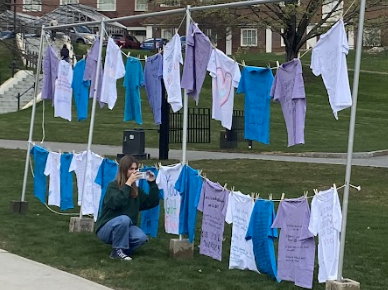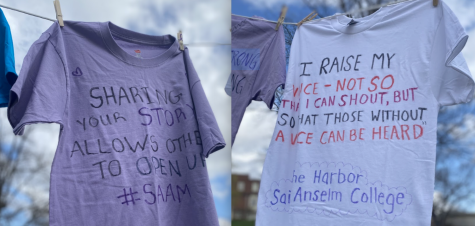Clothesline Project, Denim Day raise sexual violence awareness

The Clothesline Project was displayed on JOA quad on April 24th.(Courtesy / Nicole Kipphut)
May 4, 2023
During the month of April, the Harbor’s awareness campaigns come into focus around campus in honor of Sexual Assault Awareness Month. The Harbor, located in the lower level of the Jean Student Center, offers year-round support to students who have been victims of sexual or domestic violence, but their programming increased during April.
For this year’s Sexual Assault Awareness Month, the events offered by the Harbor included a paint night in Alumni Streets, a themed CABingo, a showing of the film It Happened Here about sexual assault on college campuses, and the awareness campaigns Walk a Day In Her Shoes and Denim Day.
Nicole Kipphut, director of the Harbor, said that she worked with a team of 30 student volunteers, CELs, and a criminal justice intern to make these programs happen. Kipphut said about the students, “They really pushed the project forward,” and explained that the students took initiative in a large part of the planning.
The Harbor partnered with Campus Activities Board for a themed CABingo on April 15th. All of the CABingo prizes were wrapped in teal paper with note cards attached explaining the significance of the color teal – ribbons in that color are common symbols to raise awareness of sexual assault.
The Walk a Day In Her Shoes campaign invited members of the Saint Anselm community to wear heels around campus on April 12th as a part of the initiative which has traditionally been a part of the International Men’s March to Stop Rape, Sexual Assault & Gender Violence. Denim Day, the last Wednesday of April, invited everyone to wear jeans “as a visible means of protest against the misconceptions that surround sexual assault.”
The Harbor partnered with the Manchester YWCA, Gender Studies minor program, and the Crisis Center of Central New Hampshire to host a showing of the film It Happened Here on April 19th. It Happened Here is “a powerful film that follows the lives of four young women and their stories of sexual assault on their college campuses, their resilience, and activism.” Kipphut said that there was a good turnout for the film showing and the attendees were able to “break up and have really good discussions” in smaller groups.
The Clothesline Project took place on April 24th. This initiative “displays T-shirts made by survivors, friends, family, or allies. T-shirts can include statistics, quotes, sayings, pictures, or the survivor’s story of abuse.” Students decorated shirts on JOA quad and the shirts were then displayed in the Davison Hall lobby for the rest of the week.
The Harbor’s programming is funded by a grant from the federal Office onViolence Against Women. The Harbor applies for the funding every three years and hopes to use it to expand their programming in the near future.
Kipphut said that the Harbor plans to expand their efforts to address particularly the needs of the LGBTQ+ and BIPOC communities, as well as the Deaf and hard of hearing community. She also said that the Harbor is working to get a restorative justice program up and running.
She described this as a “separate process for a survivor to avail themselves to” apart from Title IX, which is not always a victim-friendly process. Kipphut also said that a restorative justice process would “address the harm and have the harmer held accountable in a way that avoided Title IX.” While plans are still in the works, Kipphut said that the Harbor hopes to receive funding through the OVW grant, implement policies, and start training people in restorative justice practices. The ultimate goal is a “victim-driven, victim-focused” support system for survivors.
Overall, Kipphut observed about this SAAM that “The messages are getting out there and people are paying attention,” to awareness campaigns of sexual violence. She noted that particularly for the Clothesline Project, “a lot of students were paying attention to what they were reading on those T-shirts” on the quad.
Kipphut stressed the importance of student activism throughout this month’s programming, explaining that not only did her team of student volunteers really make the events happen, they got their peers involved in the awareness campaigns as well. Awareness is the first step towards education, which is the first step towards a nonviolent campus culture. The Harbor’s work is crucial to creating such a culture at the College.

messages of encouragement. (Courtesy / Nicole Kipphut)


